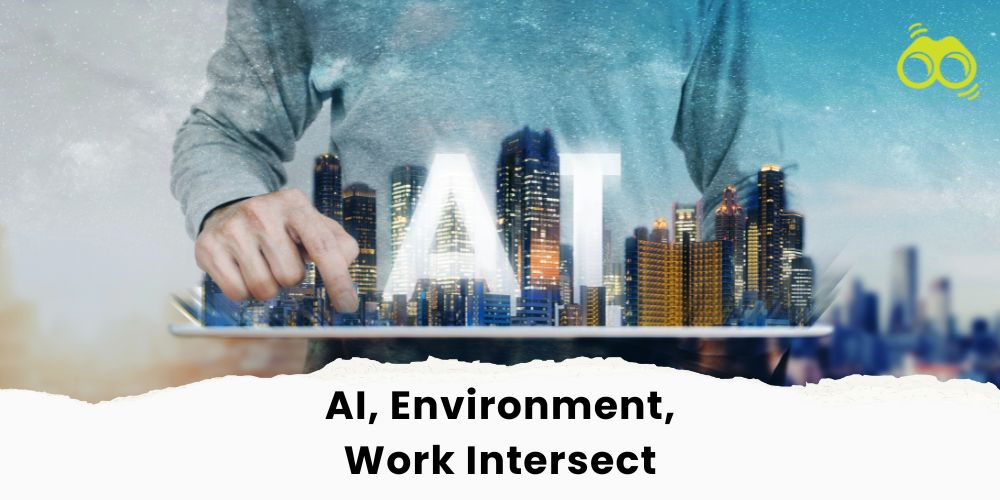Qatar’s Pioneering Conference on AI and the Future of Work Sparks Sustainable Innovations
Transformative AI Discussions at Future of Work Hiwaraat Conference Inspire Sustainability
Georgetown University in Qatar (GU-Q) recently hosted its ninth Hiwaraat conference, "A.I. Uprising: Opportunities and Challenges for the Future of Work and its Impact on the Environment." In collaboration with Carnegie Mellon University in Qatar, the event brought together experts to explore the intersection of AI and environmental challenges in the future of work. The Hiwaraat series fosters inclusive dialogue, promoting innovative solutions and informed discussions on global issues by engaging scholars, policymakers, and the public. The conference focused on Qatar and the Gulf region, followed by private discussions with high-level guests and national stakeholders. These talks aimed to create actionable plans in areas such as AI, the environment, and the future of work.
GU-Q Dean Safwan Masri emphasized the importance of a multidisciplinary approach to understanding AI's impact on planetary and social systems. He highlighted Georgetown's Jesuit tradition, which views work as meaningful and aligned with values, alongside caring for the environment as a shared responsibility. Masri also mentioned that AI is prompting a rethinking of humanity's future, potentially elevating us to new heights or unraveling the connections that bind us. Keynote speaker Dr. Moriba Jah, a University of Texas at Austin professor, stated that humanity's actions have led it toward self-extinction, but there is hope. He discussed how machines can process data and improve decision-making, stressing the importance of viewing them as collaborators. Dr. Jah concluded that sustainability depends on our choices and the use of technology.
The second keynote was delivered by Dr. Merritt Moore, a quantum physicist, ballerina, and artist-in-residence at NYU Abu Dhabi. She explored the evolving relationship between technology and humanity, emphasizing the creative partnership between humans and machines. Dr. Moore highlighted how this partnership could enhance knowledge, learning, and self-awareness in the age of AI. Mohammed Al-Hardan, Head of Technology at Qatar Investment Authority (QIA), discussed the benefits and challenges of implementing innovative technologies in the region. He noted that the long-term benefits include cheaper products and services, leading to improved livelihoods and higher disposable income. QIA is investing in AI companies to transform its digital infrastructure. It also pointed out challenges, such as power shortages and AI’s high energy demands, which raise environmental concerns in global warming and ESG frameworks.
Other speakers included Hakan Ozdemir, CEO of Siemens Smart Infrastructure Middle East, who discussed integrating transformative technologies to enhance sustainability and reduce costs. Rika Nakazawa, Chief of Commercial Innovation at NTT, shared strategies for incorporating sustainability in tech transformation. Raha Hakimdavar, Senior Advisor at GU-Q, led a panel on AI's impact on work and economic inequality. The discussion focused on preparing the next generation of workers to use AI for positive global change. The concluding panel, moderated by GU-Q Professor Alexis Antoniades, offered practical insights on AI's impact on the labor market. Salim Al-Barami from Qatar's Ministry of Labour shared how AI analyzes the labor market and guides students. Pawel Gmyrek, Senior Researcher at the International Labour Organization, provided a global overview, noting that AI could replace 5% of jobs, augment 15%, and affect 20%. However, more data is needed to understand the impact fully.
Hoda Alkhzaimi, Strategic Advisor at NYU Abu Dhabi, noted that over 25 technological breakthroughs are shaping the future of work, with AI currently dominating the focus. Emmanouil Chatzikonstantinou, GU-Q Assistant Professor, reassured that communication, organization, and teamwork will remain essential skills. While digital skills may vary with employer needs, he emphasized that adaptability to new technology would be the most crucial soft skill for the future. The Hiwaraat conference highlighted the crucial intersection of AI, the environment, and the future of work, emphasizing collaboration and adaptability for global progress. It provided valuable insights into shaping a sustainable and inclusive future through technology.
Editor's Note:
As technology continues to evolve, the recent conference on AI and the future of work showcased the transformative potential of artificial intelligence in shaping a more sustainable future. The discussions and presentations highlighted the incredible advancements and the significant role AI can play in addressing global challenges such as climate change, economic inequality, and sustainable development. Experts, innovators, leaders, and policymakers from around the world exchanged ideas on how technology can shape a more sustainable and equitable future.
Skoobuzz believes that this conference underscored the importance of ensuring AI advancements contribute to a technologically advanced, equitable, and sustainable future.














0 Comments (Please Login To Continue)